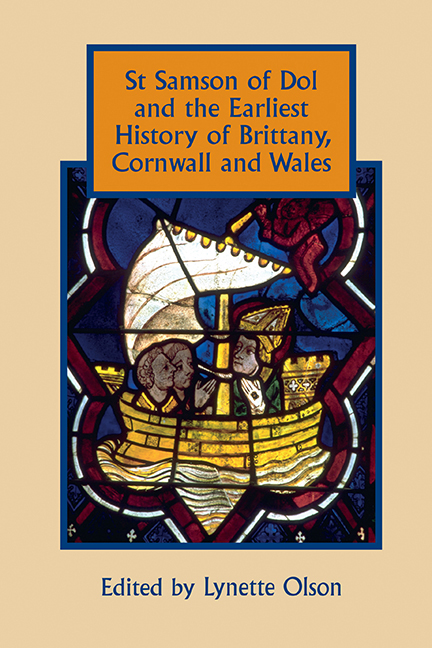Book contents
- Frontmatter
- Contents
- List of Tables
- Editor's Preface
- Map: Places associated with St Samson in the First Life
- 1 Introduction: ‘Getting Somewhere’ with the First Life of St Samson of Dol
- 2 A Family and its Saint in the Vita Prima Samsonis
- 3 La Circulation de l'information dans la Vie ancienne de s. Samson de Dol et la question de sa datation
- 4 The Hare and the Tortoise? Vita Prima Sancti Samsonis, Vita Paterni, and Merovingian Hagiography
- 5 Columbanus, the Britons, and the Merovingian Church
- 6 Apostolic Authority and Celtic Liturgies: from the Vita Samsonis to the Ratio de cursus
- 7 The Representation of Early British Monasticism and Peregrinatio in Vita Prima S. Samsonis
- 8 Present and Yet Absent: the Cult of St Samson of Dol in Wales
- Bibliography
- Index
- Studies in Celtic History
2 - A Family and its Saint in the Vita Prima Samsonis
Published online by Cambridge University Press: 05 July 2018
- Frontmatter
- Contents
- List of Tables
- Editor's Preface
- Map: Places associated with St Samson in the First Life
- 1 Introduction: ‘Getting Somewhere’ with the First Life of St Samson of Dol
- 2 A Family and its Saint in the Vita Prima Samsonis
- 3 La Circulation de l'information dans la Vie ancienne de s. Samson de Dol et la question de sa datation
- 4 The Hare and the Tortoise? Vita Prima Sancti Samsonis, Vita Paterni, and Merovingian Hagiography
- 5 Columbanus, the Britons, and the Merovingian Church
- 6 Apostolic Authority and Celtic Liturgies: from the Vita Samsonis to the Ratio de cursus
- 7 The Representation of Early British Monasticism and Peregrinatio in Vita Prima S. Samsonis
- 8 Present and Yet Absent: the Cult of St Samson of Dol in Wales
- Bibliography
- Index
- Studies in Celtic History
Summary
The considerable efforts made to understand the sources and dating of the Vita prima Samsonis (VIS) have always been motivated by the hope that the Life, if shown to be a well-founded document based on the real accounts of contemporaries, might ‘help to light up a very dark corner of the darkest period of European history’. Scholars given to more effusive evaluations of their source material have even gone as far as to liken the VIS to ‘the beam from a powerful lighthouse travel[ling] over the waves of a bay at night’, illuminating with momentary clarity a sixth-century world otherwise barely visible to the historian. In truth, however, what the Life offers is more like a series of spotlights than a constant beam. The saint's career is related through a series of vignettes, constrained for the most part by the walls of the monasteries and hermitages which briefly house him or which are founded by him. Although the Life accompanies the saint on the road as he moves through the religious houses of Wales, Ireland, and Cornwall, any wider world that surrounds these ecclesiastical outposts remains almost entirely unseen. Only in its final chapters, describing Samson's deeds in Brittany and Francia, do secular power structures and local politics attract the Life's attention. Chris Wickham may be correct to suggest that this contrast between the Insular and the Continental sections of the VIS ‘may tell us something about the evanescence of British kingship’ in this period, but the Life's indifference to secular society extends beyond the political. The saint's travels around the British Isles seem almost deliberately to avoid interaction with laymen. Their sole intrusion comes in the form of a highly stylized encounter with a crowd of idol-worshippers in Cornwall, an episode primarily intended to reflect badly on the existing churches of that region which, as a Cornish monk had already confessed to him, ‘have become lax in [their] previous ways’. Other excursions occasionally presented him with further adversaries to overcome – sorceresses, serpents, and demoniacs – but these meetings also took place beyond the fringes of ordinary society, in remote forests or beside solitary coastal huts. Whatever light the VIS does offer to the historian, a great deal nevertheless remains in the shadows.
- Type
- Chapter
- Information
- Publisher: Boydell & BrewerPrint publication year: 2018



